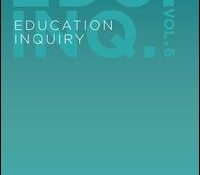tandfonline.com har udgivet en rapport under søgningen “Teacher Education Mathematics”: ABSTRACT ABSTRACT The beginning of primary education is an important time to form a good basis for students to develop their digital competence. However, the use of digital technologies is seldom a part of everyday schoolwork during the first years of primary school education. Furthermore, instruction on digital competence is often loosely connected to the students’ own ideas. Since there is obviously a need to investigate student-initiated involvement, this case study examined six to seven-year-old children’s views and ideas of using digital technology in school lessons through drawings and interviews. The results show that some of the students did not share the idea of using digital technology in their school lessons but most of the students did. In particular, the students expected digital… Continue Reading →
Like this:
Like Loading...
tandfonline.com har udgivet en rapport under søgningen “Teacher Education Mathematics”: ABSTRACT ABSTRACT Enterprise education is a policy-driven, cross-curricular phenomenon on many Western countries’ educational agendas. The expectation is that it will be implemented in different school subjects, but bridging enterprise education and different school subjects has proven to be a challenge. This article explores whether and how open-ended investigations in science education in secondary schools can be viewed as a form of enterprise education. We identify several points of contact, illuminating the premises on which enterprise education can be integrated into science education. Thus, the results contribute to the under-researched field of bridging enterprise education with school subjects in secondary education. Link til kilde
Like this:
Like Loading...
eric.ed.gov har udgivet: Today, mathematics education faces two major challenges: raising the floor by expanding achievement for all, and lifting the ceiling of achievement to better prepare future leaders in mathematics, as well as in science, engineering, and technology. Many students lack access to higher-level mathematics courses and teaching at all levels of pre-college schooling. This is unacceptable in the face of the ever-expanding technical demands posed by higher education and the 21st-century job market. Research reveals that strong academic experience is needed for both college and the workforce. Raising the cognitive demand in the curriculum is necessary for enhancing students’ career prospects. Recent trends show progress, but curriculum policies that limit course options restrict opportunities to learn for traditionally underserved students. This problem is compounded by the sorting of… Continue Reading →
Like this:
Like Loading...

